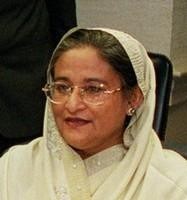Bangladesh Prime Minister Sheikh Hasina has won the country’s 10th parliamentary elections in a disputed poll that was boycotted by the opposition and its allies and held amid large-scale violence that left at least 18 dead.
Armed with a landslide “victory,” Hasina is set to form the next government even as questions are being raised about her legitimacy and the credibility of the elections. The opposition Bangladesh Nationalist Party (BNP) has demanded that the polls be declared null and void. A defiant Hasina, however, has claimed that the victory is legitimate and has said the BNP “made a mistake” by shunning the polls. The BNP and some 18 other parties stayed away after Hasina refused to step down and allow the elections to be organized by a neutral caretaker government, as they had been since 1991.
Debapriya Bhattacharya of the Center for Policy Dialogue, a Dhaka-based think tank, says the elections, held Jan. 5, were “constitutionally legal,” but their “political acceptability and moral legitimacy are questionable.” No official turnout numbers are available, but estimates reported by the media ranged from 5 percent to 35 percent, compared with more than 70 percent turnout in 2008 elections. Hasina’s Awami League won 232 out of 300 seats, although voting took place for only 147 of them, as the rest were uncontested.

